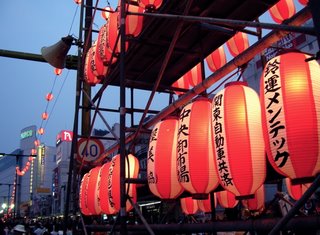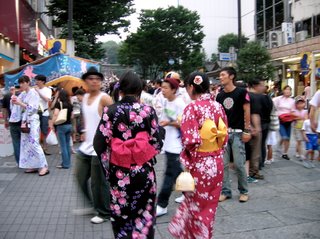Sparklers

The sparking fizz of the blazing stick in my hand made my heart leap for a moment, but with delight, not fear. Mari had purchased a variety pack of sparklers on the way to the park where our small group of friends met for a sunset picnic, and though a bloodthirsty swarm of mosquitoes drove us from our tarp within minutes of arriving, the party continued at Romain's cluttered apartment, where we devoured our combini banquet with Korean Sake and French lounge music. The sake was drained swiftly, as we lounged back on the tatami and chatted in English, Japanese, and French, and eventually the pack of sparklers began to call to us like an overripe fruit begging to be plucked. Towing along a broken hula-hoop and a bucket of water (entertainment and safety, respectively), we stumbled through the heavy night air to the parking lot opposite Romain's place, and eagerly ripped at the thin plastic encasing our treasure. When Mari had phoned me earlier that evening to invite me to the petite fete, she had asked me to bring a lighter, and now I stood with the bright plastic torch in my hand, the master of ceremonies. I flipped the flint; a column of yellow flame leapt up, and as I tipped the cluster of thin spindles into the fire, a burst of white sparks erupted like a font of light. I quickly passed the fizzling sparklers around, each small torch illuminating the childish delight spreading like fire on everyone's faces. We jumped and spun about on the parking lot asphalt, still hot from the sunny afternoon, twirling like lunatics in the joy of feeling ten years old once again. The sparklers flamed for fifteen seconds, then spattered out. Eager to continue our revelry, we quickly passed around another set of new sparklers, then another, until all that was left in the pack were a set of "dropping ball" fireworks. These very special firecrackers are used by Japanese children in competitions: everyone lights his sparkler at the same time, igniting a thin string that flares up into a tiny glowing sphere of light. As the sparkler burns, the glowing sphere grows as it descends down the string, eventually falling under its own weight and extinguishing on the ground. The last one with a glowing sphere intact is the winner. We all crouched down close together, hushed and concentrated on coordinating the ignition. Each of our spheres flared in a miniature show of lights, slowly dropping down the string in delicate beauty. A moment before we were jumping about and shouting like madmen, but now we crouched and spoke in near-whispers, afraid to disturb the exquisite orbs of light. One by one, the spheres dropped from the strings, falling into grey ash on the pavement, until there was only one left, and then it too fell and left us all in darkness.
Riding home that night, while musing at the fun of hula-hoops and sake, I thought how so much in life is like the sparklers we wrote our names with in the night. Flaring for a moment of ecstasy, blinding us with bursting light, then extinguishing just as quickly, leaving only the cloudy white tracks burned on our retinas. I suppose the trick of it is to nurture our joy, like small dropping balls of light, being careful not to shake the root. Or perhaps, after the white glow has burned its last, we should turn our faces upward, settling into the millions of tiny sparklers which wink and glow overhead, unshakable in their rapture.
*photo by Gareth Coker













